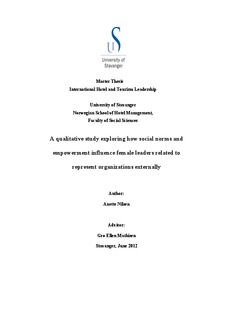| dc.description.abstract | Qualitative methods; seven in depth interviews among leaders in an chosen organization and two focus groups were chosen for this research to get as profoundly insight as possible when it comes to their perceptions of female leaders that represent organizations externally and how or if social norms in the society or/ and organization influence them. There were not found any large differences among the different leaders nor the focus groups.
Old prejudices and stereotypes, such as perceive men as having stereotypical leader attributes, or by Eagly and Karau (2002); called agentic attributes, and women as having stereotypical communal attributes as being sensitive, caring, good in social relationships, and etc., also seems to be the view among the participants in this research. When asked to describe a person who represents an organization externally, the participants also gave this person typical agentic attributes, at the same time as gender was not believed to be important; they were more concerned about age. Therefore one might assume that a female leader who is representing an organization externally acts or becomes more agentic than communal when having this role; she must leave her gender role as a woman.
Empowerment was seen as something positive among all the participants. Some of them also believed that this could contribute to gender equality, or as Attanapola (2005) claims: Helps women to be become more secure. Everybody also believed that there have to be some guidelines when representing an organization externally. And since gender was not mentioned or given any importance, one can assume that the participants believe that everybody; both men and women who are representing organizations externally need to have some guidelines and therefore none have the opportunity to act freely, at the same time as empowerment is apparent. | no_NO |
